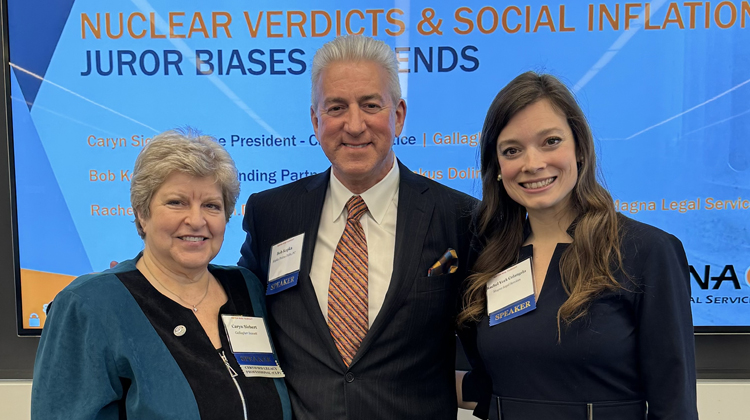How do you get the attention of 100 people attending the last session on the final day of an AIRROC conference? Well, this presentation started out with the group watching two brief videos of juries deliberating in advance of rendering their verdict. In both scenarios, audience members were able to hear the jurors discussing their opinions on the deep pockets of corporate defendants as well as the potential verdict being a “chump change“ to a corporation. These types of juror attitudes and perceptions are leading to social inflation and run-away verdicts, which in turn impact the “value” of cases in both the live and legacy space.
The panel consisted of Caryn Siebert, CLP, VP Carrier Practice/Director Carrier Engagement of Gallagher Bassett, Bob Kopka, the founding Partner of Kopka, Pinkus & Dolan and Rachel Colangelo, PhD, National Managing Director of Jury Consulting with Magna Legal Services.
Throughout the rest of the presentation, the panel discussed the components of social inflation and the impact that huge verdicts have had in the commercial auto liability sector, as well as various professional lines, which are often part of legacy books of business. Not only did they show statistics on the increase of astronomical verdicts from 2014 to 2022 but they also provided the audience with state-by-state specific results and financials by case type. While the trend from 2008 to 2012 was reductions in reserves, the trend since then has been extreme reserve development, especially in the area of medical malpractice, products liability, and transportation.
As the conversation continued, the panel discussed four main areas of concern and their impact on evaluating the settlement value of claims:
- current events,
- growing anti-corporate bias,
- reptile theory, and
- desensitization as to the value of money.
Jury awards have all been influenced negatively and outcomes are becoming more unpredictable. Magna shared a variety of statistics, including the following:
Of those potential jurors surveyed:
- 53% are somewhat or very angry about the way things are going in the country,
- 52% commented on being concerned about their own safety/vulnerability,
- 76% believe that corporate executives will lie or cover things up,
- 30% believe that it takes billions of dollars to teach a lesson, and
- 45% indicated they would ignore a judge’s instruction to get to a just outcome.
Do businesses today care more about profits OVER safety? Well, of the population surveyed, 30% strongly agreed and 50% somewhat agreed that companies care more about profit than safety. And 77% opined that corporations are using the pandemic as an excuse to raise prices.
All of the above responses provide concerns with regard to selecting and utilizing juries to resolve claims. This is even more concerning in the run-off space where often times the claims are so old that evidence is missing, spokespeople are gone, witnesses have passed away, and the knowledge/history of the file is diminished. That led the panel to a deeper dive into anti-corporate bias, including having “deep pockets” to pursue, being a “faceless“ organization, and a lack of confidence in potential corporate witnesses.
In the discussion about the Reptile Theory, it turns out that 84% of people surveyed felt they needed to be the “guardians of the community” and force companies to change their bad behavior through rendering large awards. 71% felt it was their job to keep communities safe by serving on a jury and rendering a verdict against a defendant, including 82% who felt the primary purpose of awarding damages to a plaintiff in a lawsuit is the punish the defendant.
But the panel was not about to end the day on a sour note! All was not gloom and doom and this panel provided some great tools and ideas to avoid disastrous outcomes. They discussed the:
- importance of being compassionate and apologizing in front of a jury,
- difference between taking responsibility and conceding liability,
- humanizing of the defendant and being great storytellers to explain the positive impact on the community,
- positive impact of making offers and especially addressing damages and providing counter figures to a jury by anchoring. “If you don’t show it, the jury won’t know it” was a great expression. Juries award higher damages when the opponent requests a larger award, even if that award is unreasonable in the absence of a counter.
As part of the discussion, the panel showed one final clip of a jury deliberating, and “just going with what the plaintive asked for” because the defendant did not make an offer. The lack of an offer was essentially considered an offer of zero dollars which offended jurors, angered them, and resulted in a huge verdict. The panel showed statistics documenting anywhere from a 29% decrease to an 83% decrease in the compensatory damages awarded when the defendant provided a credible damages figure, showed their work and rationale, and made the figures meaningful to jurors.
Great way to end our day of education at the AIRROC Spring Membership meeting.
